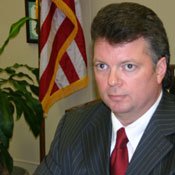Mississippi Attorney General Jim Hood and attorneys general from Louisiana, Texas, Florida and Alabama said at a press conference yesterday that BP is willing to waive a $75 million cap on some of the damages caused by the April 20 explosion of the Transocean Deepwater Horizon oil rig off the coast of Louisiana.
"They've agreed to waive (the cap)," Hood said.
Hood said that initially he "feared" BP would try to combine claims from the government, business owners and fishermen under the $75 million cap.
The Oil Pollution Act of 1990 stemmed from the 1989 rupture of the Exxon Valdez oil tanker, which dumped 11 million gallons of oil into Alaska's pristine Prince William Sound after running aground. The act also created the Oil Spill Liability Trust Fund using a tax on each barrel of oil drilled in the U.S. or imported to the U.S.
However, the same law caps liability damages an oil company is forced to pay for a spill at $75 million. Hood said he feared $75 million might not be enough to cover the damage to the environment and the fishing industry of the Gulf states resulting from the daily dose of more than 200,000 gallons of oil to Gulf waters courtesy of the sunken rig and its spewing oil well.
Alabama Attorney General Troy King said he was happy with BP's verbal commitment following a Thursday meeting between Gulf state AGs and BP officials.
"We said since this began that it is BP's disaster and BP's responsibility, and I've been pleased in Alabama, as we watched this unfold, with their commitment to accept responsibility," King said. "... I think that's a positive step forward that shows a cooperative spirit by them."
The attorneys general said BP officials compromised on other requests as well. King said the company was eager to provide quick claim assistance to ailing fishermen and tourist industry workers affected by the sludge drifting in from the devastated rig 40 miles offshore of Louisiana.
"I came to Jackson today on behalf of Alabamians who are suffering. Shrimpers, oystermen, fisherman, hoteliers, waitresses, people who are concerned now how they will make payments on their house or their boat and provide for their family," King said. "They've assured us that the claim process is up and running, and claims can be paid as quickly as 48 hours--good new in Alabama."
Hood said he was satisfied with BP's decision not to waive the rights of oil spill victims filing for quick claims: "One of my concerns is that they would be waiving any rights by participating in that process, and I wanted to make sure that BP was willing to put that (in writing) so the people will rest assured that if they do file a claim they won't be prevented later on from joining some class action or so forth."
Louisiana attorney general James "Buddy" Caldwell said BP issued a spoken agreement to put company officials in as many cities as was practical to speed up claims processing by oil-spill victims.
"They have agreed with the no limit on the number of places to (set up) to make it easier to do these claims, so that's another reason why we say we're cautiously optimistic," Caldwell said.
On a final note, Hood said the company had agreed to change--at least in a spoken agreement--contracts signed by boaters and fishermen BP paid to participate in the company's clean-up effort.
"You've heard reports that to use their boats to go out and pull booms with (BP) made them sign waivers, and found out that they were waiving rights to future lawsuits. They've agreed to ... go back and retract that, scratch that out and do a new contract. They're not going to try to enforce those waivers. And they're going to send us a list so we can notify those people."
The attorneys general said the company planned to put their commitments and concessions into writing by Tuesday.
"BP spokesman Mark Salt said the company had already recognized the ineffectiveness of the $75 million cap on damages: "We've said its inevitable that we'll pay more in second claims and we're willing to do so," Salt said.



Comments
Use the comment form below to begin a discussion about this content.